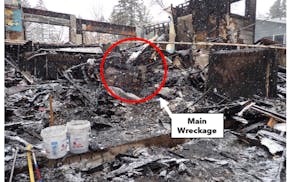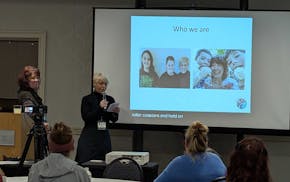I was attending a conference on improving customer relations when a man dressed in hunting camouflage walked up to me. Inscribed on his blaze orange cap were the words, "Don't shoot idiot."
"Hey Doc, remember me?" he said. "Having dangled my modifiers for years, you cured me of that common error when I first made your acquaintance in the '90s."
"I do remember you, Lester," I said, "but I think we need to review some basic English grammar. Let's begin with missing commas with forms of direct address."
"Sorry, Doc. Is that better?"
"It is. And?"
"Let's see. I should have said, 'Hey, Doc,' with a comma between the interjection and the form of direct address."
"Correct. Now how about your cap?"
"My cap? It's a riot, don't you think?"
"Quite amusing, but who's the idiot? The other people hunting in the woods with you, or the person wearing the cap, namely you?"
"Oops," he said. "Another missing comma with a form or direct address?"
"Indeed." I said. "And here the missing comma changes your intended meaning. Furthermore, haven't we discussed the difference between an apostrophe, which curls to the left, and a single open quotation mark, which curls to the right?"
"But you can't blame me for ' '90s' when it should have been ' '90s.' I only said it and the apostrophe appeared as a single open quotation mark."
"Your excuse is like dictating 'all right' to your smartphone and having it transcribed as 'alright' and claiming it wasn't your error. If you said it, you own it."
"Wow Doc, you're a tough grader."
"Again, please."
"Wow, Doc, you're a tough grader."
"Better. Now, about your second sentence, 'Having dangled my modifiers for years, you cured me …' "
"Oh, no! I didn't!"
"You did. You dangled your modifier."
"I'm so embarrassed," he said. "So rather than 'Having dangled my modifiers for years, you cured me …' I should have said, 'Having dangled my modifiers for years, I no longer make that error,' since 'having dangled' refers not to you, but to me?"
"Correct. When you begin a sentence with a modifying phrase, make sure the next thing after the comma is the person or thing modified."
"So rather than 'When pickled, I think herring tastes like caviar," it should be 'When pickled, herring tastes like caviar to me'?"
"Right."
"Got it. But I thought you were writing a column about verbs and customer relations."
"I am. The theme of the conference we're attending is, 'To connect with your reader, personalize; don't nominalize.' "
"Nominalize?"
"Yes. To nominalize is to change your verbs into nouns, as in 'It is my recommendation' rather than 'I recommend,' and 'As per your request' rather than 'As you requested.' The problem with nominalized language is that it makes you sound stilted and unnecessarily formal, and it creates distance between you and your reader."
"So rather than 'when I first made your acquaintance in the '90s,' I should have said, 'when we first met in the '90s'?"
"Precisely."
Stephen Wilbers offers training seminars in effective business writing. E-mail him at wilbe004@umn.edu. His website is www.wilbers.com.

U.S. Bancorp executive stopped responding to control tower minutes before Brooklyn Park crash

Minneapolis condo in historic Midtown Exchange building listed for $205,000

RFK Jr.'s controversial comments draw ire at Minnesota autism convention

Big medical expenses drove $176 million operating loss last year at Medica

